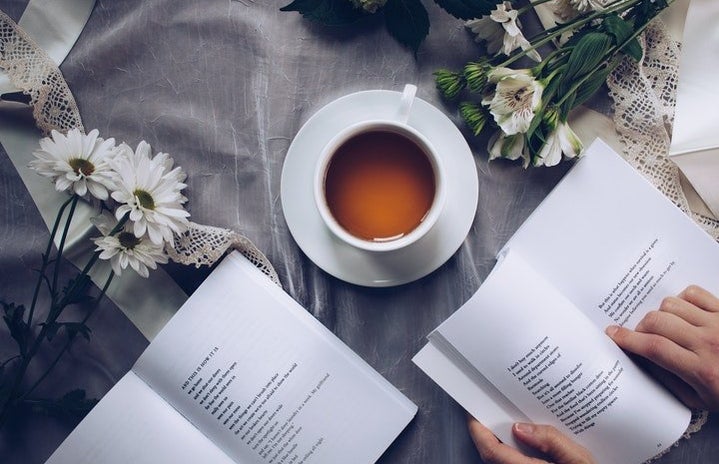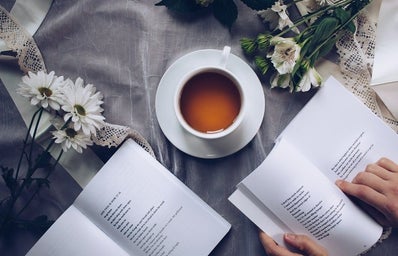Whether your only exposure to poetry has been reluctant quatrains in high school or if you saw Amanda Gorman read at the inauguration and were captivated, there’s something in the world of poetry for you.
Poetry can be intimidating if you aren’t familiar with it. There’s an unsaid expectation that seems to accompany new poetry readers like a ghost. It’s the specter of their high school English class, where poetry was only as good as the meaning that could be gleaned from it for their next essay.
Before we get any farther, let me tell you: you owe poetry nothing.
I don’t mean to say that poetry requires no engagement, or that it will always be easy to understand. I mean that there is no one requiring you to extract the author’s purpose from it or wring the verses for a moral.
Poetry can be enigmatic and beautiful and brave and bold and unexpected and thoughtful. No one, least of all the author, expects you to engage with it out of a sense of begrudging duty. Instead, think of each poem like a message in a bottle, floating across a wide, dark sea to reach your shore. There are no ghosts here. There is only you, and the words the author has written to share with you.
Once you can move beyond the classroom ghost, you open yourself up to be moved, to discover something wonderful.
Equally important as approaching poetry with an open mind is the fact that there are many reasons that people write and read poetry. What one person gets out of a poem might not be the same as another person.
There’s poetry for nearly every occasion, and every emotion.
So all that remains is to start. How do you start finding poetry to read?
1. Talk to Your Friends
You might be surprised, but many people read poetry! Ask around your friends for recommendations and you can talk about them with each other. Talking about poetry with your friends can also give you something new to explore together!
Poetry builds communities, and you’re already part of one right now. All that’s left is to read more of it. There’s nothing like calling a friend because there’s a poem that you’re still thinking about, days later!
2. Attend Poetry Events
Poetry events are occurring around you all the time! Not just open mics, but readings too. Check out your local authors, as well as international ones. Poetry isn’t just limited to men who died years before you were even born. The contemporary poetry scene is colorful and vibrant and waiting for you to find it.
For something closer to home, CWU hosts the Lion Rock Visiting Writers Series, which brings in a multitude of authors to read their work and discuss their writing process. It’s a great place to find a new favorite author, or hear work you wouldn’t encounter otherwise.
3. Sign Up for Poem-a-day Emails
Poem-a-day is an email service hosted by poets.org. When you sign up, they send you a new email every day, each with a new poem. There’s a new guest editor every month!
Weekdays are dedicated to contemporary poets and weekends are for older poems.
4. Browse Poetry from Your Library
You might be surprised at what your local library has to share with you!
Libraries often host readings, as well as having many volumes of poetry on their shelves. You can browse poems without the pressure of buying a whole book. Browsing shelves also lets you encounter poems you wouldn’t have seen any other way.
5. Figure Out What Kind of Poetry You’d Like to Read
At the end of the day, reading broadly helps you find what type of poetry you like to read, and what kind of poetry you didn’t know you’d like.
Whether that’s Emily Dickenson’s rhymed verse, or Franny Choi’s delicate thoughts in Soft Science, or Danez Smith’s Homie, finding something you like is a gateway to more poems that are similar. Keep reading, and I guarantee you’ll find something out there for you.
And wait, before you go, here are some poems I love to get you started.
- To the Woman Crying Uncontrollably in the Next Stall by Kim Addonizio
- Vita Nova by Louise Glück
- Another Elegy by Jericho Brown
- Taharah by Miller Oberman
- A Poem in which I Try to Express My Glee at the Music My Friend Has Given Me by Ross Gay
- Good Bones by Maggie Smith
- This Gold Light by Topaz Winters
- On Earth We’re Briefly Gorgeous by Ocean Vuong
For more like this follow @hercampuscwu on all socials!

